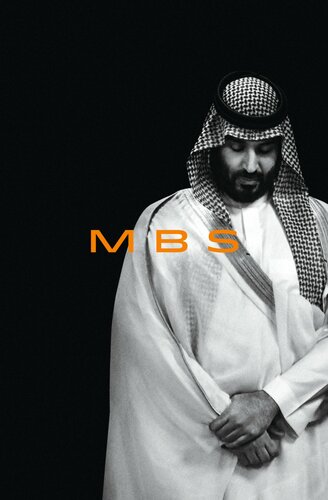
MBS
The Rise to Power of Mohammed bin Salman
کتاب های مرتبط
- اطلاعات
- نقد و بررسی
- دیدگاه کاربران
نقد و بررسی

February 15, 2020
A chilling look at the ascent of the current young prince of Saudi Arabia to first-in-line to succession. Hubbard, the New York Times Beirut chief who has been reporting from the Middle East for more than a decade, is perfectly positioned to observe the rise of Mohammed bin Salman since the accession of his father to the role of king in 2015. Mohammed, the favored son though far from being the eldest, had stuck by his father's side through his early years, eschewing a foreign education for a Saudi inculcation in the ways his father, then the governor of Riyadh Province, preferred. When his father became king, writes the author in this authoritative biographical picture, he put MBS in command of "the kingdom's most important portfolios: defense, economy, religion and oil. Then, shoving aside older relatives, he became the crown prince, putting him next in line to the throne. His father remained the head of state, but it was clear that Prince Mohammed was the hands-on ruler, the kingdom's overseer and CEO." At first, some international leaders admired the prince as a "game-changer" in a sclerotic Saudi male hierarchy, young and unafraid to "defang" the dreaded religious police and lure investors. The mood had shifted by November 2017, however, when the young prince engineered the imprisonment of hundreds of the richest men in the country in the Ritz-Carlton of Riyadh and forcibly shook them down. Sentiment continued to turn with the Oct. 2, 2018, murder of journalist Jamal Khashoggi, the most prominent critic of MBS and the royal family. "Khashoggi's killing was a wake-up call," writes Hubbard. "In a few weeks, it flushed away much of the goodwill and excitement that MBS had spent the last four years generating." Throughout, the author, synthesizing information gleaned from hundreds of interviews, displays his impressive diligence as a journalist continually blocked by censorship and intimidation. As complete a portrait of an elusive autocrat as can be expected.
COPYRIGHT(2020) Kirkus Reviews, ALL RIGHTS RESERVED.

Starred review from March 1, 2020
Rising from obscurity as one of hundreds of Saudi princes, Mohammad bin Salman, or MBS, as he is often referred to, became Saudi Crown Prince in 2017, having been titled by his father, King Salman. Here, New York Times Beirut bureau chief Hubbard brings to his narrative a broad understanding of the Middle East, which enabled him to interview numerous Saudi citizens to help frame his assessment of a man who may very well become one of the most significant world leaders during the current century. Hubbard covers how the new Crown Prince has initiated a number of reforms in Saudi Arabia, such as granting women the right to drive and making the country more open to tourists. While striving to present a balanced, nuanced account, Hubbard remains sharply critical of the leader's penchant for ruthless acts against perceived enemies, such as the killing of journalist Jamal Khashoggi in 2018. This account is, by far, the best characterization of this mercurial leader, along with his varied alliances and how he came to develop them. VERDICT An important and keen assessment of the Saudi Crown Prince that should be on every bookshelf.--Ed Goedeken, Iowa State Univ. Lib., Ames
Copyright 2020 Library Journal, LLC Used with permission.

Starred review from March 23, 2020
Journalist Hubbard debuts with an incisive portrait of modern Saudi Arabia and 34-year-old crown prince Mohammed bin Salman, better known by his initials MBS. Though much about MBS’s early years remains unknown, Hubbard details his close relationship with his father, the governor of Riyadh, following the untimely deaths of two of MBS’s older half-brothers, and his willingness to threaten with violence those who don’t fall in line. After his father’s ascension to the throne in 2015, MBS took control of the royal court and became minister of defense. He implemented ambitious social and economic reforms, including rolling back the kingdom’s ban on women drivers, and courted Western investors with plans to build a $500 billion “smart city” near the Red Sea. He also declared war on the Houthi rebels in Yemen, escalated tensions with Iran and Qatar, detained hundreds of ministers and royal family members in the Ritz-Carlton hotel in a move billed as an anti-corruption push, and empowered underlings to aggressively silence dissidents—a campaign that led to the slaying of journalist Jamal Khashoggi in Saudi Arabia’s Turkish consulate in 2018, severely damaging MBS’s international reputation. Hubbard enriches the narrative with informed discussions of Saudi history and culture, illuminating the kingdom’s complex blend of religious fundamentalism and technological ambition. This deeply researched and vividly written account provides essential insight into a figure poised to lead the region for the next half century.

March 1, 2020
In 2018, Saudi crown prince Mohammed bin Salman (MBS) became notorious for ordering the assassination of journalist Jamal Khashoggi, and he was recently alleged to have used WhatsApp to hack Washington Post owner Jeff Bezos. Such ham-fisted attacks have led some observers to compare MBS to a comic-book villain. But in this timely biography, New York Times Beirut bureau chief Hubbard considers such behavior as part of the prince's much broader career within Saudi Arabia, where his ruthless consolidation of power, emphasis on modernization, and criminalization of dissent have reshaped society. Hubbard explores how MBS rose through the royal family by foul means and fair, and how, once in control, he developed his brand of populist authoritarianism. He has sidelined conservative clerics, loosened restrictions on women, and reached out to Western innovators and thought leaders, but his intolerance of any real or perceived questions or challenges limits the transformation's depth. MBS, who rules with very few institutional constraints, will likely be a long-term force in global politics. Hubbard's early assessment provides valuable insights into the prince's MO.(Reprinted with permission of Booklist, copyright 2020, American Library Association.)

























دیدگاه کاربران